How do you monitor and report changes in patient symptoms or behavior?
JUNIOR LEVEL

Sample answer to the question:
I monitor and report changes in patient symptoms or behavior by closely observing their condition during routine check-ups and follow-up visits. I pay attention to any physical or behavioral changes that may indicate a worsening or improvement in their health. When documenting these changes, I use the electronic health record (EHR) system to accurately record the details and notify the physician or other members of the healthcare team. This helps in tracking the progress of the patients and making informed decisions regarding their care.
Here is a more solid answer:
As an Internal Medicine Nurse Practitioner, I utilize a multidimensional approach to monitor and report changes in patient symptoms or behavior. During patient assessments, I perform a thorough examination and review their medical history to establish a baseline. I carefully observe their physical and behavioral cues, noting any changes that may indicate improvement or deterioration in their health. To gather more objective data, I order and interpret diagnostic tests such as x-rays and laboratory tests. Additionally, I engage in active communication with patients and their families, actively listening to their concerns and addressing any questions or doubts they may have. When documenting these changes, I leverage the electronic health record (EHR) system to ensure accuracy and accessibility of the information. I collaborate closely with physicians and other members of the healthcare team, sharing my observations and insights during collaborative discussions and meetings. This multidisciplinary approach enables the timely identification and communication of changes in patient symptoms or behavior, facilitating prompt adjustment to their care plans if necessary.
Why is this a more solid answer?
The solid answer provides specific examples of how the candidate uses their clinical skills, communication skills, critical thinking skills, and healthcare technology to monitor and report changes in patient symptoms or behavior. It highlights the importance of collaboration with the healthcare team. However, it can be improved by including more details on the specific actions taken to monitor and report changes, as well as how the candidate uses healthcare technology in their practice.
An example of a exceptional answer:
As an Internal Medicine Nurse Practitioner, I have developed a comprehensive system for monitoring and reporting changes in patient symptoms or behavior. During patient assessments, I not only rely on the physical examination and medical history but also employ validated assessment tools and questionnaires to gather more specific information about their symptoms and quality of life. I engage in active listening and effective communication, allowing patients to share their concerns and preferences. To ensure timely identification of changes, I have implemented a proactive system of follow-up appointments and regular check-ins. These ongoing interactions allow me to monitor their progress and detect any new developments or changes in their symptoms or behavior. I also leverage healthcare technology, utilizing the EHR system to document and track changes accurately. By collaborating closely with the healthcare team, including physicians, nurses, and specialists, I share my observations and insights in a structured and organized manner, which facilitates interdisciplinary discussions and decision-making. Furthermore, I actively participate in continuing education and professional development opportunities to stay up-to-date with the latest best practices and medical developments in internal medicine.
Why is this an exceptional answer?
The exceptional answer goes above and beyond in providing specific examples of how the candidate uses their clinical skills, communication skills, critical thinking skills, and healthcare technology to monitor and report changes in patient symptoms or behavior. It also highlights the importance of ongoing monitoring and proactive follow-up appointments. The candidate demonstrates a commitment to continuous learning and professional development.
How to prepare for this question:
- Familiarize yourself with validated assessment tools and questionnaires commonly used in internal medicine to monitor patient symptoms and quality of life.
- Develop effective communication skills, including active listening and the ability to address patient concerns and preferences.
- Stay updated with the latest advancements in healthcare technology, particularly electronic health record (EHR) systems.
- Emphasize the importance of collaboration and interdisciplinary teamwork in your answers.
- Highlight your commitment to ongoing learning and professional development.
What are interviewers evaluating with this question?
- Clinical skills
- Communication skills
- Critical thinking skills
- Healthcare technology

